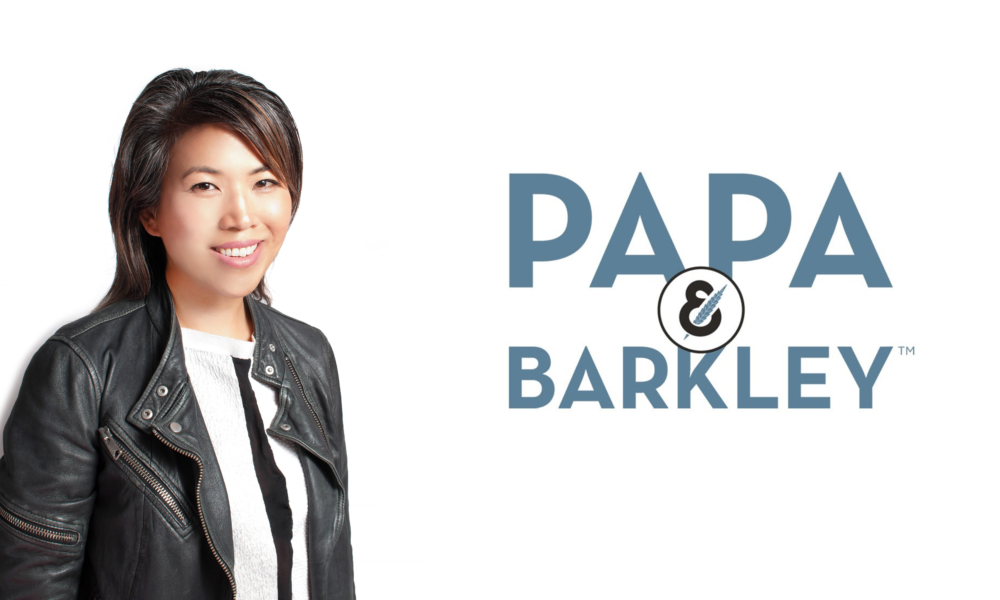A candid conversation with two cannabis leaders-of-industry about how to make diversity and inclusion more than mere buzz words.
[dropcap letter=”T”]he cannabis industry hasn’t traditionally been known for being the most inclusive and diverse industry, and in the wake of the conversation shifting away from its original roots, we wanted to get to the core of how change can happen. In order to spend more time on addressing the hope that the industry will open up to far more women and people of color in terms of ownership, cultivation, and marketing, we spoke to two major players in the market: The Arcview Group and Papa & Barkley.Laura Toomey is the Chief of Staff at The Arcview Group and her experience and expertise span the cannabis, fashion, tech, and marketing industries among many. Evelyn Wang is the CEO of California-based cannabis wellness brand Papa & Barkley whose experience and expertise spans over 15 years of senior management for major beauty brands that included L’Oréal and Estee Lauder.
Both women offer a unique perspective showcasing aplomb and efficacy in their brands, approach to growth, and how to implement lasting change in the cannabis industry. Recently, the two joined forces to discuss gender and racial disparity in the industry and what the industry can do to support the evolving conversation.

As the industry strives to bridge the very transparent gap of women and people of color, what can brands like Papa & Barkley and Arcview do to create more opportunity; and what insight can you offer to those looking to be part of changing the narrative?
Laura Toomey (LT): Research on this subject, especially as it pertains to the cannabis industry, can be challenging to navigate. That’s why The Arcview Group’s Women’s Inclusion Network partnered with NCIA to release the white papers, Building New Foundations in the Cannabis Industry: Creating Gender Parity through Ownership, Leadership, Boards, Pay Equity, Branding, and Capital, that was authored by 14 incredible women in the industry. The papers are focused on research, data, personal stories, and are accompanied by toolkits that allow the reader to work towards implementing change. There is a very long road ahead to equality, but if you are looking for a place to start, I would suggest downloading the papers and beginning to research for yourself. They are free to access at arcviewgroup.com/ncia.
Here’s a quote from the Gender Parity in the C-Suite white paper that might inspire you to rethink the way your current organization is structured and start making real change. This paper was authored by Christine De La Rosa (The People’s Dispensary), Kelly Perez (kindColorado), and Elise Serbaroli (Strimo.)
“According to the latest gender-parity report from McKinsey & Co. and LeanIn.org, just 72 womxn for every 100 men are promoted and hired as managers. Only 58 Black womxn and 68 Latinas for every 100 entry-level men get promoted to the manager level, while 64 Black womxn and 57 Latinas for every 100 men are hired as managers. In fact, womxn of color, womxn with disabilities, lesbian and bisexual womxn report ‘by and large worse’ experiences on the job than womxn on average. Black womxn and womxn with disabilities overall say they have received less manager support and less sponsorship than womxn in other groups.”
Evelyn Wang (EW): Surround yourself with a diverse team. Period. Change can’t happen without the right people around the table to surface their viewpoints and drive transformation from the inside out. As critical decisions about investments, products, campaigns, and key partnerships will reflect the team that had a voice in making them.
As a member of an under-represented group, you do carry the dual-edged privilege and burden of representation and responsibility. Once you get through the door, you need to create deliberate pathways for those behind you to succeed. That is how you change the narrative.
What are some of the most critical obstacles we need to overcome as women, industry influencers and innovators?
 LT: Women in every industry face the same challenges with C-suite and board representation, pay equality, and access to capital—just to name a few. Not to be repetitive here, but the white papers mentioned above dig into many overarching issues. For me personally, I have a hard time with how opinionated everyone is about the way a woman should act in the workplace—if they are authoritative it’s often perceived as “too bossy”, if they are introverted it can be perceived as “not confident enough”, if women ask for a raise they need to go into granular detail about the exact reasons why they deserve it, and the list goes on and on. It’s belittling and creates a toxic work environment.
LT: Women in every industry face the same challenges with C-suite and board representation, pay equality, and access to capital—just to name a few. Not to be repetitive here, but the white papers mentioned above dig into many overarching issues. For me personally, I have a hard time with how opinionated everyone is about the way a woman should act in the workplace—if they are authoritative it’s often perceived as “too bossy”, if they are introverted it can be perceived as “not confident enough”, if women ask for a raise they need to go into granular detail about the exact reasons why they deserve it, and the list goes on and on. It’s belittling and creates a toxic work environment.
I do not believe women should have to act like men in order to be successful. Women are incredible exactly as they are.
Like their male colleagues, they should be given the space to grow confidently into their own, unique sense of self. I have been in many situations where men have spoken down to me or treated me like I was not worthy to be contributing to the conversation. It definitely leaves a lasting impression.
I believe that men and women should take extra care, now and in the future, to mentor women and minorities. Empowering others with knowledge is invaluable.
EW: Having the confidence to believe in your voice, direction and perspective is the most difficult and critical obstacle to overcome. When you do not necessarily have a clear role model that you identify with, you need to find your own path and realize it’s okay not to follow a traditional template of what leadership looks like. Personally, I’ve found more and more success as I’ve leaned into my own intuition of how to lead, influence and innovate. Avoiding the desire to conform to traditional notions is something you have to actively work on sometimes.
What can female founded brands do to gain more access to growth capital and brand visibility in a predominantly male dominated industry?
LT: Join our Women’s Inclusion Network, for a start! We started the network to help address the inequalities in this industry by providing networking and educational opportunities. We have bi-weekly, interactive mentorship workshops that teach women about financial modeling, investments, marketing, building the right team, and everything in between. Once a month we host virtual happy hours, and we have an active, private Slack channel for instantaneous member-to-member communication. We have pitch competitions for female founded companies, exclusive shopping opportunities that feature female founded brands, and you’ll be connected with an incredible, supportive community of investors, operators, and employees at every level in their career journeys.
And yes, in case you were wondering, we DO allow men to join as well. We don’t believe that women should have to implement change alone. Everyone needs to contribute to the movement. As long as the men in our network also rally behind equality, they are more than welcome to join.
It’s a tricky industry to navigate, and we don’t want any woman to feel like she needs to go it alone!
EW: That is an interesting question because I see a split between female founded/owned brands versus female operated brands. There are a lot of amazing female entrepreneurs in cannabis who are building uniquely positioned, creatively expressed, but oftentimes smaller scale brands. I have a lot of admiration for them!
On the other hand, there are fewer women in my situation of being hired into leadership positions at already established, larger scale companies. These are two very different situations with different levels of access to growth capital. The truth of my situation is that I have access to a board that is well-versed and connected to the capital markets. My experience has been that of a hired operator rather than an entrepreneur.

As an operator, I have learned the importance of ensuring you work with investors that share your vision and appreciate brand building. From that perspective, I would advise female entrepreneurs to seek out investors who have a track record and interest in investing in women-led brands. I know the value of investors who have an intuition and appreciation for your mission statement and product category.
I would also say get comfortable telling your success story and asking for introductions to the people you want to meet. While I do not typically like to speak in generalizations, I will say that women tend to be less boastful. Men tend to go for it in terms of speaking to their successes! A humble and pragmatic model of leadership is better for organizational management and growing a company in a solid way, but a more boastful and aggressive style of leadership may be more effective for the short-term purpose of fundraising and access to capital.
Papa & Barkley is by far one of the most trusted brands in the industry. What do you as a company feel is most critical in terms of awareness and wellness in the cannabis community, and for those just beginning to understand the healing aspects of the plant?
EW: We’ve stayed true to innovation principles of using a solventless whole-plant approach to our input materials because we know that cannabinoids work best when they are present in combination with each other. Our whole-plant infusion process is a difficult and expensive approach, and we believe it’s worth it because it keeps the full range of cannabinoids and terpenes intact, resulting in a more efficacious product. Our end products truly deliver on our mission to unlock the power of cannabis to improve people’s lives. Every time we have the opportunity to educate someone and get them to consider a natural cannabis-based solution to a wellness issue, we have made another step in the journey to destigmatize this amazing plant.
The most important thing for us is to continue to educate on the integrity of our process, why it creates a better product, and to scale the reach of that education both in California and beyond.
What’s on the horizon for Papa & Barkley and how have you prepared for the world opening back up?
EW: We’re on a journey to become a global best-in-class wellness brand, powered by cannabis. We are preparing to scale in a way that holds true to what is authentic and purposeful. I have a vision of Papa & Barkley’s balm in every American medicine cabinet!
As the world opens back up again, there is a wonderful sense of optimism and rejoining back into communities. We are evaluating what this means for how we evolve as an organization and interact with each other, our consumers and our key partners. Health will continue to be a top-of-mind priority for the world and we intend to be there to support consumers’ wellness needs.
To learn more about both brands, visit: thearcviewgroup.com | papaandbarkley.com





